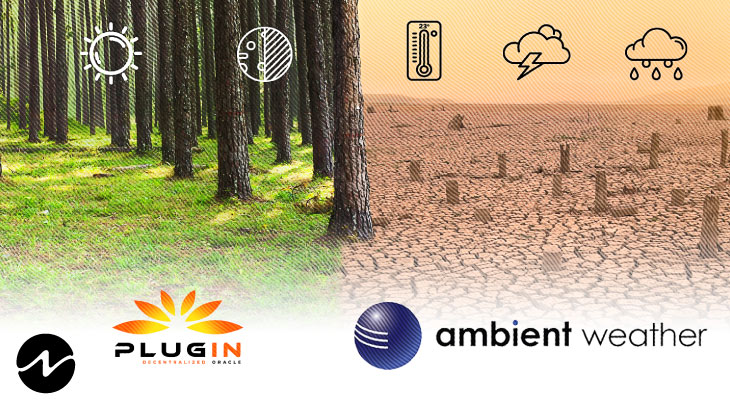The global climate is changing rapidly as compared to the pace at which natural variations occurred in the past. And with the climatic changes, previously unseen occurrences that could hinder many day-to-day operations in society are becoming too common.
For instance, global temperatures rose by roughly 1.8 °F between 1901 and 2016. The high temperatures are worsening and making frequent different types of disasters—heat waves, storms, floods, droughts, etc. Warmer climates are also creating atmospheres that collect, retain, and dump more moisture, changing weather patterns in a way that wet areas become wetter and dry areas become drier. Increased drought, intense floods, and storms are causing numerous public health and safety concerns.
As well, the increased unpredictability of weather patterns is posing risks to numerous weather-dependent activities—including but not limited to agriculture, travel, education, sports, etc. Given that some of these activities touch on the social and economic wellbeing of our societies, increased unpredictability in weather poses significant challenges to populaces globally.
While unpredictable weather poses a threat to day-to-day activities, all is not doom and groom. Unique partnerships leveraging smart weather forecasting and decentralized data-transfer protocols are making it possible for the inception of technologies that can point out weather changes or any related events in real-time. The innovations are giving stakeholders the ability to verify weather patterns that may affect their activities, further improving how society interacts with the ever-changing climatic conditions.
To highlight the importance of unique partnerships in unlocking the potential of smart weather management systems, let’s look into the recently concluded Plugin-Ambient Weather partnership and why it matters.
Plugin-Ambient Weather Partnership: Why does it matter
With the rise in demand for accurate weather forecasts in day-to-day activities, the Plugin–Ambient weather partnership avails users with more options regarding smart weather stations for homes, businesses, farms, and more. As well, the partnership avails network members with an option to become data providers.
Given that ambient weather is available globally, the partnership allows users of ambient weather’s smart weather stations to participate in gathering weather-related data and claim the rewards therein.
Worth noting: The basic criteria a user needs to meet to participate in Plugin WFN’s use case as a data provider include; having uninterruptible power and Wi-Fi, and outdoor space to install an Ambient weather station. These preconditions ensure seamless data transfer via an approved Ambient sensor.
Plugin–Ambient Weather Partnership: How can users Participate
Individuals or organizations that are interested in smart weather systems and willing to be part of Plugin WFN project must first purchase Ambient Weather’s smart weather system. Upon acquiring and installation of the smart weather forecast station, the user should go ahead and connect their device to Plugin’s portal. The registration process involves generating an ‘applicationkey’ & ‘apikey’ to register the new device.
Upon creating the appropriate API keys for their device, users will have to check if their sensors transmit data to the ambientweather.net portal. Thereafter, users will be required to submit their device’s applicationkey, apikey, latitude, longitude, country, state, city, zip code, and wallet address to Plugin’s portal. If the data is satisfactory, team Plugin will approve the user’s node.
Once approved, a user will be required to stake 1000 PLI & 5000 XDC to register as a data provider for Plugin WFN. After staking is done successfully, a user will receive an approved WFN device ID for their node, allowing the user’s sensor to gather weather-related data for Plugin WFN’s project. Thereafter, a user can claim their reward for providing weather-related data.
Interested users can view the detailed step-by-step process here.
What are the likely benefits of Plugin–Ambient Weather Partnership
Increasing Utility for Weather Forecast Data
Previously, weather intelligence systems relied upon distributed radar and satellite systems to gather data. While the data has been useful, it has been general in nature, thus limiting its scope. Particularly, such data has lacked accurate and real-time aspects that help businesses make more informed choices.
On the other hand, generic weather forecasts from distributed radar systems produce raw data that’s relatively expensive, confusing, and inaccessible to many end-users. The raw data is often nested within weather stations in airports, government agencies, and academic institutions. As well, the data is released to the public via endpoints controlled by centralized organizations like the National Oceanic and Atmospheric Administration (NOAA), National Aeronautics and Space Administration (NASA), the World Meteorological Organization, etc. Many a time, released data sets aren’t in real-time and may be complicated, necessitating expert assistance to digest the data for ordinary end-users.
However, the Plugin–Ambient weather partnership solves these problems. With decentralized weather forecast sensors (made possible via Ambient weather’s smart solutions), Plugin collects highly granular data that’s cryptographically signed before being uploaded onto PLI’s blockchain. Thanks to the partnership, data users can verify the provenance of the data by checking the coordinates tagged with the data.
What’s more, the decentralized, yet highly trustworthy, nature of collected weather forecast data increases the accuracy, accessibility, and user-friendliness of climate data. It also lowers the costs of climate data. The resulting ease-of-use and ease-of-access to highly accurate and verifiable climate data give autonomy to end users that could not previously acquire the data and make appropriate decisions. The increased access to data opens-up opportunities for numerous use-cases that leverage the diverse nature of climate data. Some unique examples include crop insurance and logistics.
Reducing Climate-Related effects globally
The Plugin–Ambient weather partnership also unlocks benefits and synergies that have significant potential to reduce climate-related effects. With highly granular data and improved provenance, the partnership holds the key to unlocking efficiencies in agriculture, disease control, conservation, humanitarian and military operations, and mitigating climate-related challenges.
In agriculture, for instance, highly granular data that’s made possible by the partnership will help alleviate challenges straining the agriculture production system. Worth noting, projections show that the agriculture sector will have to feed roughly 9.8 billion people by 2050. Accompanying the rising population is a multiplicity of adverse environmental effects that put significant strain on the productivity of previously valued arable regions. These strains are projected to increase given the predicted extreme weather conditions and increasing effects of global warming.
Nonetheless, food production systems can benefit from highly accurate and granular data—availed by the partnership between Plugin and Ambient weather.
For instance, farmers and food providers can benefit from accurate and real-time climatic data in many ways. In particular, having highly granular data on weather patterns helps food producers make accurate decisions before, during, and after their production cycles. With climate change requiring farmers and breeders to respond to changes faster and in smarter ways, data-driven decentralization of weather forecasting (as seen in the Plugin – Ambient weather partnership) can improve predictions and improve breed selection in dynamic production environs. Improvements in breed selection will result in increased productivity.
On the other hand, decentralized data collected via Ambient’s weather sensors has the potential to improve humanitarian and national security issues relating to climate change. With natural disasters becoming more catastrophic and displacing large populations, national security agencies in different countries have to rely on smart and highly accurate data to optimize their response to adverse climatic events.
In the recent apocalyptic floods in Southern Asia, for instance, the highly granular data collected by Plugin can help key stakeholders improve the preparation and response to such disasters. Specifically, the highly accurate data availed in real-time can allow security agencies to allocate resources (food supplies, manpower, and equipment) where most needed before, during, and after a natural disaster. Improved planning can help save lives and prevent misuse of vital resources during such events.
Nurturing Sensing-as-a-Service (SEaaS) model
Sizeable networks of sensors are in use today. And there’s numerous potential in data collected by these nodes, globally. Be it weather stations tracking atmospheric changes or shipping trackers, the SEaas model has the potential to create passive revenue streams as well as provide resources for important enterprises.
In this context, Plugin–Ambient Weather partnership pioneers the SEaaS space by leveraging blockchain and remote sensors availed by ambient weather’s smart weather solutions. Through the partnership, users in ambient weather’s network can leverage the partnership to earn some benefits. On the other hand, the incentives offered, and the automatic manner in which data is collected and transmitted guarantees the accuracy and verifiability of data gathered through the Plugin and Ambient weather set-up.
While the partnership unlocks synergies associated with weather forecast data, it also highlights the potential held by solutions employing blockchain-based smart contracts and decentralized data nodes. It also highlights the possibilities that blockchain and decentralized data providers can achieve by ensuring the verifiability of data without centralized organizations checking and rechecking the data for accuracy.
Ultimately, a vibrant SEaas space will help unlock new economies and improve benefits to organizations, governments, and the entire society.
Final Thoughts
With the increasingly changing and unpredictable climatic patterns, more industries are experiencing previously unseen challenges. Some of these industries play very crucial roles in our society, and mitigating the ensuing climate effects is paramount. Though numerous solutions to climatic change and its effects exist, decentralized tech holds a lead position in providing sustainable results.
In line with these views, the partnership between Plugin and ambient weather guarantees accurate, verifiable, and highly granular climatic data. The data, which is availed in real-time, provides some important insights to guide vital activities in agriculture, disease control, humanitarian initiatives, conservation, etc. The smart climatic weather data systems also unlock an array of opportunities in a variety of weather-dependent industries
That said, Plugin-Ambient weather’s partnership makes significant contributions toward empowering today’s society through accurate, and verifiable weather data.
For more information, kindly visit the following links:
A). Plugin
- Plugin Website
- Plugin WFN user interface
- Plugin WFN – Ambient weather unit onboarding instructions
B). Ambient Weather








